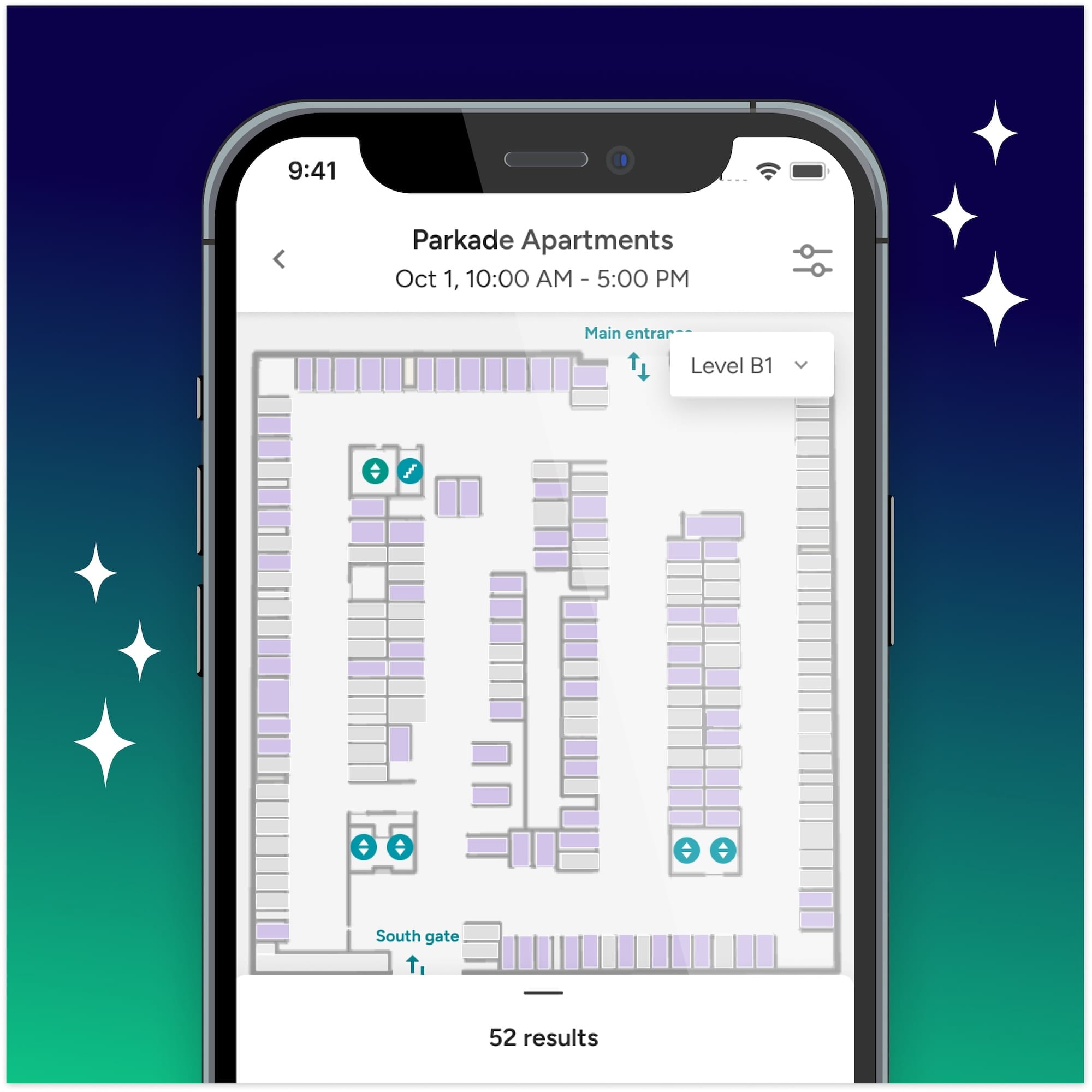

TABLE OF CONTENTS
How to pick the best parking allocation strategy for a residential building
There are two things residents want when it comes to parking — adequate parking near their homes and enough spots for their vehicles and their guest’s vehicles when needed. These requirements seem very simple on an individual basis, but once multiplied, it presents a complexity of challenges that building planners have been grappling with for decades.
Residential buildings have three parking options — unassigned parking, assigned/bundled parking or unbundled parking. Each option has its advantages and disadvantages, and we’ll highlight how Parkade can shift which option works best for your building.

The most significant advantage of residential unassigned parking spots is that they are utilized on a first-come, first-served basis. However, this tends to be their most significant disadvantage as well since parking is never guaranteed.
Unassigned parking spots maximize usage but minimize reliability. These spots are available to everyone 24/7, and there are no limitations on how long you can leave your car parked. Residents never know whether they’ll find an available parking spot at their building because other residents or even their guests may have already taken all the available spots.
Additionally, unassigned parking spots have caused some sparks between neighbors. Sometimes residents might prevent car owners who don’t live in their buildings from parking in the unassigned spots. Some extreme cases may include residents preventing the driver from leaving by parking another vehicle directly behind the non-resident’s parked car.

Assigned or bundled parking spots are often included in the price of renting or buying a home in a multifamily building. Assigned parking spots give owners a hassle-free parking experience since they know that they have a parking spot dedicated for their use only.
Assigned parking spots maximize reliability, but they minimize the utilization of parking spots. Only one household has access to the parking spot.
When it is not in use, no other resident can park there. This can result in a parking spot sitting empty throughout the day when the owner is away from home, or worse — permanently empty if the resident doesn’t have a need for the spot.
Happily, Parkade can solve this problem! Parkade makes it easy for residents to share their assigned spots with other residents and other residents’ guests, just as we’ve done in many buildings.
Unbundled parking is an excellent strategy that separates the cost of housing from a cost of parking space. It’s quickly gaining popularity around the country, and is increasingly recommended by policy makers and utilized by developers.
Unbundling allows residents to rent parking separately from their housing. By doing so, residents can save money and space by using fewer parking stalls, and building owners can quote lower prices for apartments or condos when advertising them. Unbundled parking is also more equitable and can reduce the total amount of parking required for the building.
Unbundled parking is a better option than assigned/bundled parking, as the building can lower the rents and also better utilize the usage of available parking spots. For example, instead of renting a 1-bedroom with parking for $1,200/mo, the unit could be rented for $1,100/mo and parking rented separately for $100.
This strategy leads to residents who don’t really need parking deciding to utilize fewer (or no) parking spots, while other residents who want extra parking can gain the ability to rent extra spots.
This parking configuration, however, usually has some downsides in most buildings (fixable with Parkade!).
In general, most buildings have 30-day or 6-month minimum rental terms to rent a parking spot, due to the work usually involved for property managers to handle billing and assigning the spot. This leaves money on the table from residents who would pay for spots for hours, days or weeks, but don’t have the option from their building’s managers.
In most buildings today, unbundled parking will still sit empty when the owners are away from home as they can’t share it with other residents.
Unassigned parking is easy, but is infeasible in most buildings due to demand for reliable parking.
Assigned and unbundled parking is usually the preferred option in most buildings, but takes time considerable for property management teams to manage — as spots assignments must be communicated, spots can’t be double-assigned to different people and payments/leases for unbundled parking must be handled.
Parkade makes all of those problems go way — reducing empty assigned parking and making unbundled parking a lot easier to implement.
With Parkade, you can avoid imposing minimum amounts of time for the leasing parking!
This is a huge win for tenants, whose parking needs vary and have frequent needs for short-term (or shorter term) parking than what’s usually available. Parkade is duration-agnostic, so residents can lease parking for any period — with no involvement from property management.
This is a huge step toward increasing building revenue and resident satisfaction, especially at buildings that have empty parking.
Your building can finally eliminate the “Guest Parking” spots, which are often abused and rarely a revenue source because they’re so difficult to charge for.
Instead, Parkade can help buildings eliminate these spots and just convert them to unbundled parking. That parking can instead be rented by a resident for themselves, or for guests — but the “guest parking” signs that invited abuse and were a source of frustration can go away.
Would you like the parking spots in your building to be available to residents only?
Parkade can help out with that, too. The app is just like a Facebook group, giving you full control over the level of privacy that's right for your building, including the ability to restrict access only to residents and staff.
When your building rents unbundled parking, a spot is typically booked monthly by a resident — or not at all. Letting a spot sit empty because someone is not willing to book it long-term is a huge waste. Instead, you can use Parkade to rent it for any period of time, whether it is for a few hours, days, or weeks.
Many buildings have static pricing on their unbundled parking — which naturally produces a poor outcome. That means that either parking ends up being too expensive (resulting in too many empty spots) or too cheap (resulting in all spots being sold out, and having to create a waitlist).
With Parkade, buildings can automatically adjust prices to manage demand and offer a mix of short-term and long-term parking.
Tired of not being able to park near your building? Parkade can help you resolve that issue, whether your building offers assigned or unbundled parking spots. With the help of our app, residents can share their assigned spots when they are not in use with others.
Parkade is a win-win solution both for residents and the building management.
.jpg)
As parking management becomes increasingly digital, security becomes critical — and we’re excited to share that we've achieved a major security milestone.
Read Story
We’re thrilled to announce one of our most significant leaps forward this year: the launch of dynamic maps across our mobile and web applications.
Read Story
Now that AB 1317 is official, it’s time to brush up on the requirements and see how your properties stand to benefit.
Read Story